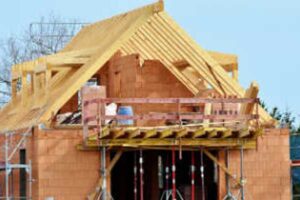What Is Green Building?
Green building is a method of construction where various resources are used to create homes and commercial

buildings that are more energy-efficient and take less of an environmental toll on the planet. Green building isn’t just about using eco-friendly materials, but also using eco-friendly processes during construction.
What IS LEED Certification?
LEED stands for Leadership in Energy and Environmental Design. This green building program was started by the US Green Building Council, with development beginning in 1993. Today, the program is used to promote green building in construction projects across the globe.
Becoming LEED-certified may require additional upfront expenses for a company, but it can yield long-term savings through tax breaks, higher rents for residential buildings, and other benefits.
Benefits of Going Green
There are many benefits of going green for construction companies, the communities where they’re building and the people who live there, and for the planet as a whole. These benefits can be economic, environmental, and also improve the overall quality of life for employees in commercial buildings and tenants in residential ones.
Environmental Benefits
Of course, going green is first and foremost about protecting the environment. Without green building initiatives, new construction takes a devastating toll on the environment. Designing buildings with green principles in mind and completing projects with green building practices can help greatly reduce the damage urban growth has caused to our planet.
Specific environmental benefits of green building include:
- Better protected biodiversity and ecosystems
- Improved air and water quality
- Reduced waste
- Conservation and restoration of natural resources
Cost Benefits For Businesses
While the environmental benefits of green energy may be well-known, companies still need economic incentives to make the switch. Many CEOS may worry about how green building could affect their bottom line. Fortunately, there are some economic benefits to going green as well:
- Reduced operating costs
- Improved worker productivity
- Higher asset values and profits
Community Benefits
Implementing green building practices helps improve our cities as a whole, along with the personal lives of our citizens. A greener city means a healthier city – both in the large-scale sense of the planet becoming healthier, along with individual health improvements.
Here are some community benefits that can be expected as more and more building companies institute green building practices:
- Improved worker/tenant health and comfort
- Better indoor air quality
- Reduced strain on local infrastructure
- Improved overall quality of life
How Can My Construction Company Go Green?
There are a variety of green building practices which can be used both for new projects and renovations to existing structures. Some of the most common practices being used in the construction industry today include:
- The use of recycled and renewable building materials, such as recycled glass and steel, bamboo, and rubber
- Energy-efficient doors and windows
- Paints and stains with low VOC (volatile organic compounds)
- Green roof systems, such as rooftop gardens, rainwater management systems, and protections against harmful UV rays.
- Water harvesting and purification systems
- Designs that maximize natural light, which helps reduce lighting requirements and energy costs, along with keeping buildings warmer during the winter
- Buildings powered by renewable energy, such as solar panels
